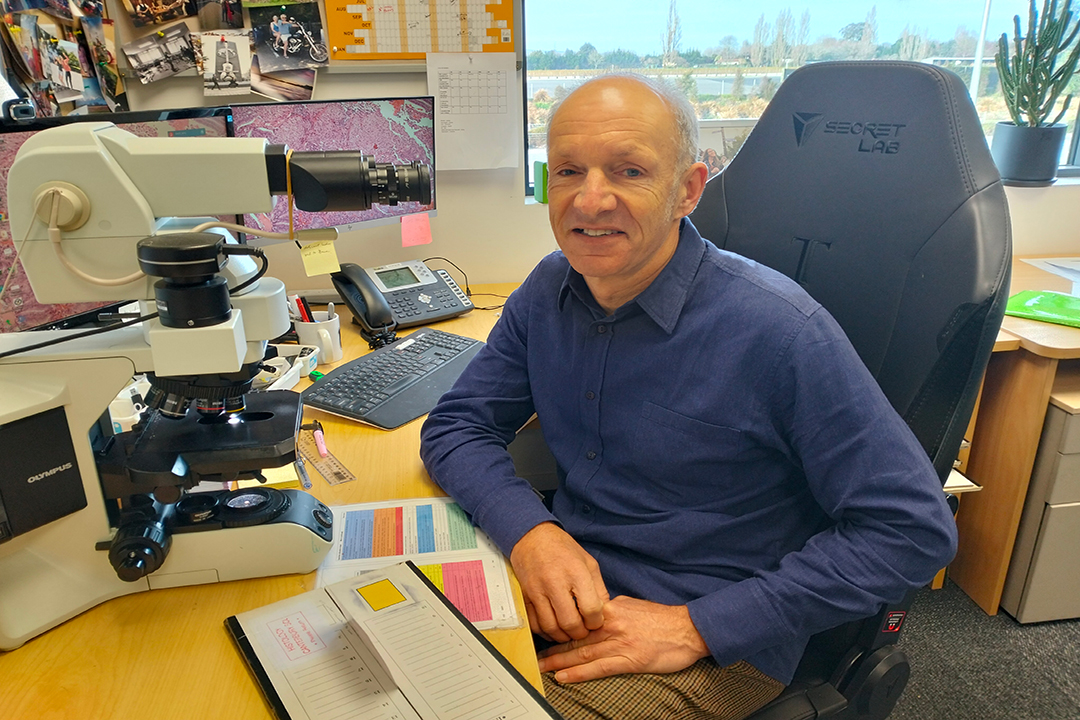Prostate cancer is the most commonly diagnosed cancer, apart from skin cancers, for men and finding an effective treatment involves scientists and health professionals in New Zealand and around the world.
For Awanui Anatomical Pathologist Dr David Roche, recently spending time at laboratories in Melbourne and New York was an opportunity to see the practices they have in place for their research, and how digital and artificial intelligence could shape the future.
“I am part of a project working with the urologists to understand and standardise how pathologists look at the cancer grade and stage in prostate specimens which have been surgically removed,” says David, who is based in Christchurch.
“So, it was fantastic to get the chance to spend time at the TissuPath and Peter Mac laboratories in Melbourne, and then a two week attachment in the pathology department at the Memorial Sloan-Kettering Cancer Centre (MSKCC) in New York, to meet with world-renowned urology pathologists and see how they are looking at these aspects of prostatectomy.”
David says the pathologists at MSKCC were very generous with their time while he was attached to their department.
“I had opportunities to sit in on sign-out sessions with the consultants and fellows and attended their multidisciplinary meetings where cancer cases were discussed with the pathologists, surgeons, oncologists, radiologists and various other specialists. They have a consensus conference for particularly interesting or difficult cases, and the whole department analyses them, either on the multi-head microscope or on digital images.
“It was very useful comparing the practices at the Awanui laboratory in Christchurch with what is happening at these overseas laboratories. I learned a few useful things and it was good to know our practice matches up very closely and favourably.”
David also had the chance to see how MSKCC is using digital pathology, which went fully into operation during the COVID-19 pandemic, as part of their preparations for pathologists having to work from home.
“MSKCC implemented the Aperio system, and using the same scanners as Awanui will be putting in at our labs, so it was interesting to see how the implementation went. They also used a couple of other different scanners for special situations, such as whole mount prostatectomy slides and cytology, and have integrated the digital pathology into their clinical record system. Aside from the technological challenges, it was interesting to learn about the human factors involved in the implementation”
However, what did catch his attention was the artificial intelligence (AI) which MSKCC are currently evaluating.
“By spending time with the IT people and talking about AI, I got to see first-hand the AI system they are using, and how it integrates with the Aperio digital pathology system coming into the Awanui lab,” says David.
“In particular for prostate cancer, the AI has the capability of diagnosing and grading cancer on prostate biopsies with a very high degree of accuracy. They have other modules for breast cancer helping with grading and estrogen receptor analysis, and lung cancer looking at biomarkers, such as PD–L1 analysis.”
David says although MSKCC are only in the evaluation stages of this at present, he is no doubt all laboratories, including Awanui, will be using this technology in the not too distant future.
“It is still in the early stages, but the potential is there for AI and digital technology to really shape how we work. Beyond AI, MSKCC are looking at deep machine learning technology for predicting tumour prognosis and response to therapy.
“When this becomes established it will be an absolute game changer.”
